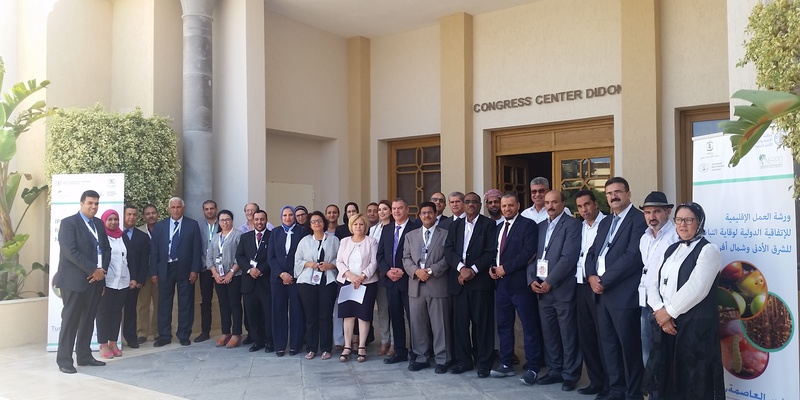The 2017 IPPC Regional Workshop for the Near East and North Africa Successfully Held in Tunisia
Posted on Вт, 22 Авг 2017, 15:06

21-24 August 2017: Fifteen Near East and North Africa countries have been gathered in Tunis (Tunisia) from the 21st to the 24th of August 2017 at the invitation of the International Plant Protection Convention (IPPC) Secretariat and the Regional Office of the Food and Agriculture Organization for the Near East and North Africa Region (FAO-RNE). The annual regional workshop aims at strengthening phytosanitary capacities for effective enforcement of internationally harmonized standards for phytosanitary measures to prevent the introduction of plant pests to their countries, while facilitating the international trade of plant products.
The International Plant Protection Convention (IPPC) is an international agreement aims to protect cultivated and wild plants by preventing the introduction and spread of pests (see www.ippc.int) to which 183 contracting parties currently adhere.
Protecting plant resources and the environment against plant pests requires global as well as national actions. Pests introduced and spread through international trade and human activities caused economically and environmentally negative impacts. Forty-one IPPC International Standards on Phytosanitary Measures (ISPMs) have been adopted, promoted and are being implemented by member countries for saving the plant resources, economy and environment. Phytosanitary activities need to be increasingly coordinated at the regional scale, through the efforts of the Near East Plant Protection Organization (http://www.neppo.org/).
During this IPPC Regional Workshop, the Near East and North Africa (NENA) countries reviewed new draft ISPMs. At the same time, the meeting was a great opportunity to update the participants on the new developments of the IPPC activities, new emerging issues in plant health, and to exchange and share the experiences and the updates between the participants in the field of plant protection in general.
On the margins of the workshop, the participants reviewed the progress made in the implementation of the contingency plans against the introduction and spread of the so-called olive killer - bacterium Xylella fastidiosa. The contingency plans have been developed by contracting parties in 2016 with support of FAO and IPPC. The workshop shaded the light on the recent updates of some plant pests which could figure a real threats to the NENA countries in the near future such as Fall Armyworm on corn and several crops and Cochineal scale (scale insects) on cactus which already causing serious issues in Morocco.

